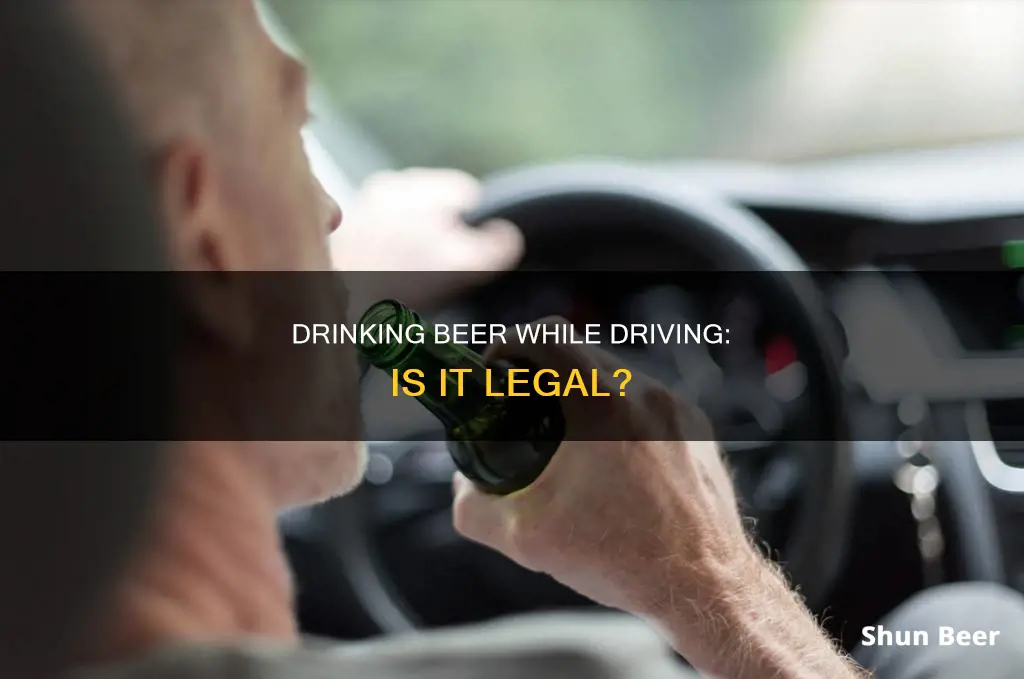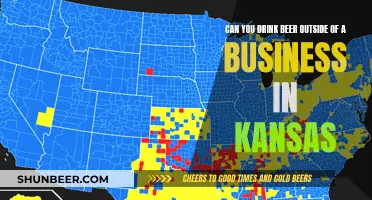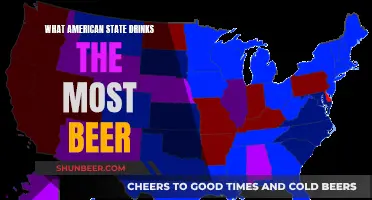
Drinking and driving is a dangerous combination. While one or two drinks may keep you under the legal limit, any amount of alcohol can impact your ability to drive safely. In the UK, there are no open container laws, so it is not illegal to drink and drive as long as you are under the limit. However, if the police see you drinking, they may consider it careless driving, and you could be charged with driving without due care and attention. In the US, open container laws vary by state, with some allowing passengers to drink alcohol in a car and others prohibiting it entirely. Regardless of the law, drinking and driving is a risky choice that can have serious consequences.
| Characteristics | Values |
|---|---|
| Can you drink a beer while driving a car? | This depends on where you are. In the US, there are open container laws which make it illegal to drink while driving. In the UK, there are no open container laws, so it is not illegal to drink while driving, but you can be charged with careless driving. |
| Can you drink a beer while driving a car on private property? | In the US, passengers can drink alcohol in a car on private property in all 50 states. |
| Can passengers drink a beer while in a car? | In the US, passengers can drink in the car without restriction in Connecticut, Delaware, Missouri, Tennessee, and Virginia. In Alaska, passengers can drink if the open container is behind a solid partition that separates the driver from the area occupied by passengers. In Mississippi, drivers can drink from an open bottle as long as they remain under the legal BAC limit. |
What You'll Learn

Drinking and driving laws in the UK
In the UK, it is illegal to drive if your blood alcohol concentration (BAC) is above the drink-drive limit. In England and Wales, the limit is 80 milligrams of alcohol per 100 millilitres of blood (80mg/100ml), while in Scotland, the limit is lower at 50mg/100ml. These limits are the same for driving or attempting to drive, and for being in charge of a motor vehicle.
The penalties for drink-driving in the UK can include imprisonment, an unlimited fine, and an automatic driving ban. The specific penalty is decided by magistrates on a case-by-case basis. For example, driving or attempting to drive while above the legal limit can result in up to 6 months' imprisonment and a ban from driving for at least a year. Causing death by careless driving when under the influence of drink can lead to a driving ban of at least 5 years and an extended driving test before your licence is returned.
While there is no law prohibiting drinking alcohol while driving in England and Wales, it is generally not recommended due to the risk of exceeding the drink-drive limit and the potential for distracted driving. The police can pull you over and administer a breath test if they see you drinking while driving, and you may be charged with careless driving if your actions fall below the standard of a competent driver. Additionally, even if you are under the legal limit, you may still be charged with driving without due care and attention.
In Scotland, it is completely illegal to drink and drive, regardless of whether you are above the drink-drive limit.
Stoop Drinking: Beer, Law, and You
You may want to see also

US open container laws
In the US, open container laws refer to laws that prohibit drinking alcohol in public places by limiting the existence of open alcoholic beverage containers in certain areas. These laws are in place to restrict public intoxication, especially when operating a vehicle. While there is no federal open container law, individual states have their own laws that vary across the country.
Open Container Laws in the US
In most states, open container laws ban the drinking and possession of open alcoholic beverages in vehicles by both drivers and passengers. However, there are exceptions in certain states. Here are the key details about open container laws in different states:
- Alaska: Passengers can have open containers, and consumption is allowed behind a solid partition separating the driver from the passenger area.
- Arkansas: Passengers can have open containers but cannot consume alcohol in the vehicle.
- Connecticut: Passengers are allowed to drink alcohol in a vehicle.
- Delaware: Passengers can drink alcohol in a vehicle. Additionally, open containers are allowed when carrying liquors other than beer.
- Hawaii: Open containers are permitted for carrying beer, liquor, and wine.
- Kansas: Allows the carrying of open alcoholic liquor containers.
- Louisiana: While open containers are generally prohibited, the city of New Orleans allows possession and consumption of alcoholic beverages in open plastic containers, excluding glass bottles or containers.
- Mississippi: The only state that does not expressly prohibit the possession of an open container while driving. Drivers can consume alcohol as long as they remain under the legal blood alcohol limit.
- Missouri: Passengers can drink alcohol in a vehicle.
- Rhode Island: While there is no law prohibiting consumption by passengers, the driver can be fined or have their license suspended if open containers are present in the vehicle.
- Tennessee: Passengers can drink alcohol in a vehicle.
- Virginia: Having an open container in the car creates a presumption that the driver has been drinking, but this can be rebutted with evidence. Passengers are allowed to drink without restriction.
- West Virginia: Passengers can have open containers but cannot consume alcohol in the vehicle.
- California: Has strict laws prohibiting open containers in vehicles and consumption of alcohol by both drivers and passengers on public roadways.
- Other States: Many other states, including Indiana, Florida, Oregon, Alabama, and more, have specific cities or areas where open containers and public consumption are allowed.
Definition of an Open Container
It is important to note that the definition of an "open container" may vary slightly between states. Generally, a container is considered open if it has a broken seal, a missing cap, or if some of its contents have been removed. This includes cans, bottles, flasks, or any other vessel containing alcohol.
Penalties for Violations
Penalties for violating open container laws differ across the US. In some states, violations may result in fines, jail time, license demerit points, community service, or a combination of these consequences. It is important to refer to the specific laws in your state to understand the penalties associated with open container violations.
The Working of Beer Cup Filling Stations Simplified
You may want to see also

State-specific laws
In the US, open container laws prohibit drivers and passengers from drinking and possessing open alcoholic beverages in vehicles. While these laws vary across states, the general rule is that having beer, wine, or other alcohol in the passenger area of a vehicle can have legal consequences. Here is a state-specific overview of open container laws:
Connecticut, Delaware, Missouri, Tennessee, and Virginia
Passengers can drink alcohol in a vehicle without restriction in these states. However, in Virginia, having an open container in the car creates a rebuttable legal presumption that the driver has been drinking. This means that if you are pulled over with an open container, the officer can assume the driver was drinking, but this assumption can be challenged with contrary evidence.
Alaska
In Alaska, an open container is permitted when it is behind a solid partition separating the driver from the passenger area. Therefore, a passenger in this area can drink.
Rhode Island
Rhode Island law states that no person shall operate a motor vehicle on public highways with an unsealed alcoholic beverage container within the passenger section. However, there is no law regarding consuming or possessing an open container if you are not operating the vehicle. So, passengers can drink, but the open container means the driver is breaking the law and can be fined or have their license suspended.
Mississippi
Mississippi is the only state where you can have an open container, and passengers and drivers can drink as long as the driver remains under the legal limit of 0.08 Blood Alcohol Concentration (BAC).
States with Open Container Laws
Forty-nine states and Washington, D.C., have laws about open containers or consumption of alcohol in a motor vehicle by the driver. Some states, like Virginia and West Virginia, allow passengers to drink alcohol in a moving vehicle if there are no local ordinances banning it.
States Complying with Federal Standards
As of 2022, 38 states and Washington, D.C., have laws that comply with federal standards banning all open alcohol containers anywhere in the vehicle. These laws apply to both the driver and passengers and cover possessing and drinking alcohol from an open container.
States with Unique Circumstances
In Illinois, an open container of cannabis must be in the passenger section of the car, not sealed, odor-proof, and child-resistant. Minnesota and Mississippi consider the amount of cannabis in the passenger area, with violations resulting in fines or jail time.
Beer Tower Tech: Glycol Cooling Explained
You may want to see also

Drinking as a passenger
Drinking alcohol while driving is illegal in all 50 states. However, as a passenger, the laws are more relaxed.
In most states, passengers are prohibited from drinking alcohol in a moving vehicle. However, in some states, passengers are allowed to drink alcohol while in a moving vehicle. These include Alaska, Arkansas, Connecticut, Delaware, Mississippi, Missouri, Rhode Island, Tennessee, Virginia, and West Virginia.
Even in states where drinking as a passenger is permitted, there are still restrictions. For example, in Alaska, passengers can drink alcohol only if they are behind a solid partition that separates them from the driver. In Rhode Island, passengers can drink, but the driver will be breaking the law if there is an open container in the vehicle.
In most states, passengers can drink alcohol in a car if the car is parked or operating on private property. There are also some other exceptions to open container laws. For example, in most states, passengers are allowed to drink in the living areas of motorhomes and hired vehicles such as taxis and limousines. In addition, most states allow passengers to carry open containers of alcohol in the trunk of a vehicle or in another area that is not easily accessible to the driver or passengers.
Open container laws vary by state, but they generally prohibit the possession of open alcoholic containers in the passenger area of a vehicle and the consumption of alcohol within the vehicle. These laws apply to all types of alcoholic beverages and all occupants of the vehicle. In most states, both the driver and the passenger can be charged with a crime if there is an open container in the vehicle.
Do LCBO Gift Cards Work at Beer Store?
You may want to see also

DUI charges
Drinking and driving is a dangerous and illegal activity. While the specifics of DUI charges vary by state, the penalties are consistently severe. In most states, it is illegal to have open containers of alcohol in the passenger area of the car. An open container is any vessel that has ever contained alcohol and is readily accessible to the driver or passengers. This means that even if a beer can still be sealed, it will be considered open if it has been briefly opened.
In most states, both the driver and the offending passenger may receive a violation if an open container is found in the car. In some states, passengers can be charged with public intoxication or other traffic violations. If the passenger is underage, they can face additional consequences and misdemeanor charges.
In the United States, the blood alcohol concentration (BAC) limit for driving is 0.08%. Driving under the influence can result in the loss of driving privileges, fines, and a possible jail term. In California, for example, drinking in a car on a public road carries a maximum penalty of $250. However, if drinking alcohol causes your BAC to exceed the legal limit, you may face more severe charges, such as a DUI.
Drinking Beer on the Porch: Legal or Not?
You may want to see also
Frequently asked questions
No, it is illegal to drink a beer while driving a car in the US. In nearly every state, you cannot have any open container of alcohol in the passenger area of the car.
Drinking a beer while driving a car is not illegal in the UK, but it is strongly discouraged. If the police see you drinking a beer while driving, they may consider it careless driving. If they believe your driving has fallen below a reasonable standard, you may be charged with driving without due care and attention.
This may depend on the country and local laws. For example, in some U.S. states like Mississippi, you can drink and drive as long as you remain under the legal blood alcohol concentration (BAC) limit. In contrast, in Scotland, it is illegal to drink any amount of alcohol and drive. It is important to check the local laws and regulations before drinking and driving in any country.







